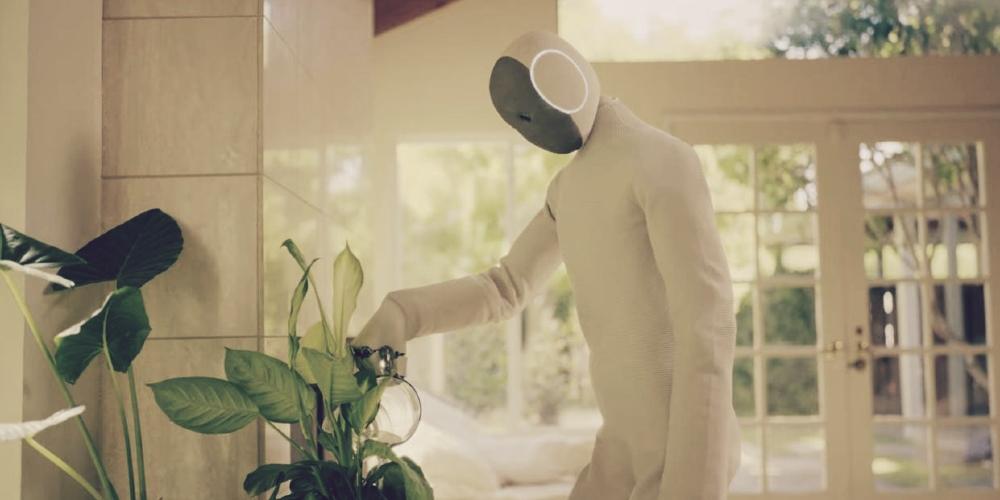And you thought AI computer agents were going to spy on you, this thing is total surveillance of you and your home, all uploaded to the cloud. And the audio report says that a remote human can takeover. What if you’re a threat to the state, will a human takeover and merc you. Can a hacker merc you, trash your house? And credit to The No Agenda Show for the clip.
I Tried the First Humanoid Home Robot. It Got Weird. WSJ.mp3
https://discernreport.com/chore-performing-ai-robot-to-hit-homes-in-coming-months-for-20000/

By Daniel Corvell
The age of the robot housekeeper is no longer science fiction. A humanoid AI robot, designed to perform everyday chores, is reportedly set to enter homes within the next few months — and it’s already generating both fascination and unease.
1X Technologies, the company behind this futuristic machine, claims “NEO” can clean, organize, cook, and even interact with people in a way that mimics human understanding. According to the New York Post, the company plans to release its first consumer-ready versions soon, with a price tag around $20,000 — roughly the cost of the cheapest compact cars.
It’s being hailed as a breakthrough in home automation, combining robotics and artificial intelligence to create what some are calling the “AI maid.” But beneath the convenience lies a deeper question: what happens when machines begin replacing human work and human connection — not just in factories or offices, but in our living rooms?
From Helper to Household Replacement
For decades, science fiction warned of a world where machines become part of daily domestic life. Shows like The Jetsons imagined cheerful robotic helpers that cooked breakfast and vacuumed the floor. Yet the reality approaching now is more complex.
The new humanoid robots, powered by advanced AI models capable of real-time learning, can adapt to individual homes. They can recognize objects, interpret spoken commands, and even anticipate user preferences. Developers claim they are “safe, obedient, and efficient,” but the same technology that makes them helpful could make them highly intrusive.
These systems rely on continuous environmental scanning — cameras, sensors, microphones — feeding data into cloud-based AI processors. That means your home’s private moments could theoretically be analyzed, stored, or even shared.
Then, there’s the human factor. A “feature” of NEO allows humans at 1X Technologies to take over the robot and help it learn more complex tasks when needed. They will see with NEO’s cameras, hear with its microphones, and directed it remotely.
For Bible believers, this development ties into a larger theme of discernment in a rapidly automating world. As humanity delegates more of its responsibilities to machines, society risks not only job displacement but also the erosion of meaning found in work, stewardship, and service — principles deeply woven into biblical understanding.
For conspiracy theorists, the implications write themselves.
The Price of Convenience
The sales pitch is simple: convenience, efficiency, and modernity. A machine that never complains, never tires, and can learn to fold laundry, mop floors, and unload the dishwasher sounds like a dream come true for busy families or elderly individuals seeking independence.
Yet even those benefits demand a sober look. Every technology that promises liberation has historically introduced a new form of dependency. Smartphones connected the world — and also made it addicted. The internet democratized knowledge — and also centralized surveillance.
Will the AI maid free humanity from menial labor, or quietly enslave it to corporate-controlled automation ecosystems?
A Step Toward the “Smart Servant Society”
The rollout of humanoid domestic robots also marks a critical turning point in the rise of technocratic dependency — where humans no longer simply use machines, but coexist with them as quasi-equal participants in daily life. This shift carries profound social and spiritual consequences.
In Genesis, God gave mankind dominion over creation — to cultivate, care for, and work within it. The dignity of labor was never a curse, but part of divine design. Replacing human effort entirely with artificial intelligence blurs that sacred boundary, redefining what it means to be human.
The Book of Revelation warns of a coming world system where, depending on one’s interpretation, humanity’s autonomy is gradually surrendered to a centralized authority through deception and convenience. While an AI maid may seem harmless, it represents one more step toward a culture conditioned to trade control for comfort — a culture easily guided by unseen powers through digital systems.
Discerning the Future
It’s easy to dismiss these concerns as paranoia. But discernment requires seeing beyond the surface. When technology offers to make life effortless, we should ask: who benefits from that effortlessness? Who holds the data? Who programs the morality of machines that interact with our children, hear our prayers, and watch us daily?
There is nothing inherently evil about innovation. The issue lies in dependence without wisdom — progress without principles. As these humanoid robots prepare to enter our homes, Christians and truth-seekers alike must remember: not everything that serves us is serving our good.
The call of Scripture remains unchanged — “Prove all things; hold fast that which is good.” (1 Thessalonians 5:21). That command applies as much to the next generation of home robots as it does to any spiritual or cultural trend.